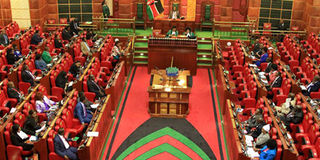Covid-19 tax Bill will hurt economy and should be rejected

The National Assembly. PHOTO | FILE | NATION MEDIA GROUP
What you need to know:
Bill seems to overlook the economic realities that necessitated the incentives in the first place.
It seems to communicate that the priority for this country is tax collection.
While it purports to implement the changes proposed by the President, it quickly introduces a raft of measures that significantly reverse the relief that has been offered.
On March 25, President Uhuru Kenyatta announced several measures in response to the Covid-19 pandemic and directed the National Treasury to implement them as a matter of urgency.
They were well received. The only question was the extent to which they would mitigate the looming economic pain. But the message was clear: The private sector need to be cushioned in the wake of what is now clearly going to be the largest economic shock of the past 100 years.
As businesses try to make sense of this evolving situation, working to balance mitigation of job losses and keeping essential products in supply, the support they need from the government is the swift and urgent execution of the measures and continuous engagement on more to ensure longevity. Instead, the National Treasury, on March 31, published a proposed Tax Amendment Bill that does the exact opposite.
It has been noted that Covid-19 is especially cruel to those with pre-existing conditions. This applies to individuals as well as governments and societies. It means that, in the absence of proper social and economic structures, the impact by the pandemic on some countries will be severer than elsewhere and they will take a longer time to bounce back.
Kenyan manufacturers have always stated that progressive economic policies exist in our country; the crux has been their execution or lack thereof. The translation of the President’s stated policy into the Tax Amendment Bill has significantly undone any optimism that was felt by the business community following the tax relief.
The Bill proposes to increase taxes as opposed to cushioning businesses during this crisis. It seems to communicate that the priority for this country is tax collection. While it purports to implement the changes proposed by the President, it quickly introduces a raft of measures that significantly reverse the relief that has been offered.
While countries around the world are on a tax-cutting spree to mitigate the clear and present danger from the Covid-19 crisis, this Bill says Kenya is going in the opposite direction, to the detriment of its people.
No matter how explicable these amendments, the timing could not be worse. The raft of proposed changes is long and has been analysed by some experts, but I shall highlight a few that demonstrate their impracticality at the height of a global crisis.
Firstly, the Bill proposes to reverse many benefits and incentives granted across sectors in the last few years, some as recent as 2019. For instance, the allowable tax expenses for listing on the Securities Exchange, VAT on property transactions for REITS, income tax exemptions for pension payments to persons over 65 and tax deductions for electricity costs granted to manufacturers. Very few tax incentives seem deemed fit to survive this Bill.
The perception of the government’s ability to deliver incentives is compromised by these proposals, as the Bill seems to overlook the economic realities that necessitated the incentives in the first place. Even the much-lauded Infrastructure Bonds interest did not survive their main benefit — tax relief on interest.
Secondly, the Bill seems to have no input from the real world and environment of Kenya especially in the face of a crisis that has never been experienced before. In the midst of the largest health scare in the world, it proposes to increase the cost of pharmaceutical manufacturing by moving medicines from zero-rated to VAT exempt; a move that has been repeatedly shown to increase the cost of products to consumers. Additionally, whilst our food baskets are being ravaged by locusts and food supplies are threatened, the Bill seeks to increase the costs of pesticides used to control the pestilence. When global GDP is feared to contract into depression, the Bill threatens to disincentivise investment by the reduction of capital deductions to investors.
In the face of the unprecedented challenge that we face as a country and humanity as a whole, and the stated intentions of the government, the Tax Amendment Bill 2020 proves to be counterproductive. It chips away at the collective spirit to trudge on, despite the difficult circumstances, garnered by the citizens and the business community over the past three weeks. It diverts our efforts when we really should all be focused on trying to see our country through the pandemic.
Parliament ought to to reject any changes beyond the President’s proposed tax relief measures. Our focus should be on getting businesses through this difficult period and also building a strong post-Covid-19 recovery plan.
Mr Kunyiha is the vice-chairman, Kenya Association of Manufacturers. [email protected].




